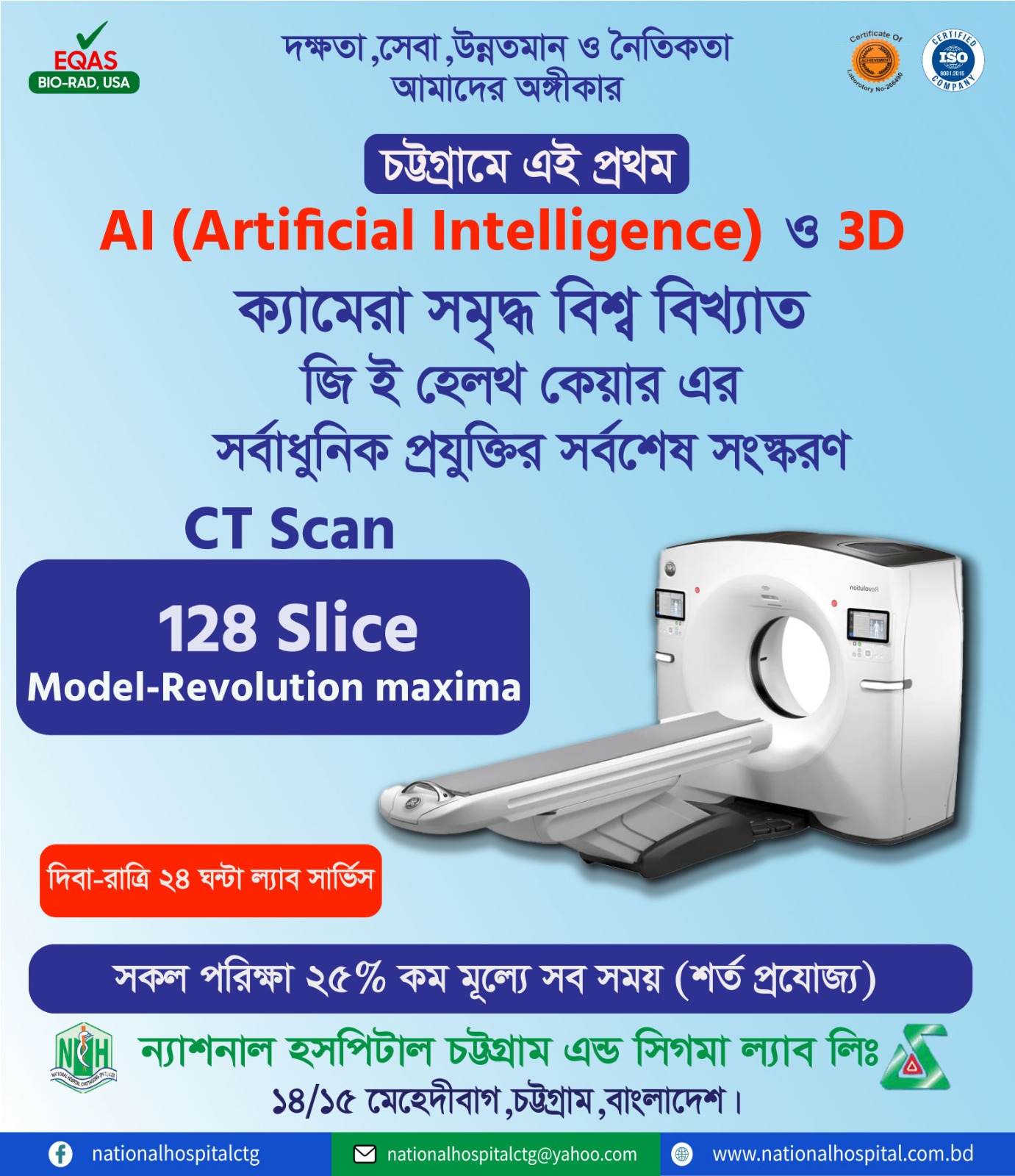Best CT Scan in Chittagong

What is a CT Scan Test
A CT scan, or computed tomography scan, is an imaging test that uses X-ray technology to produce detailed images of the inside of the body. It combines a series of X-ray images taken from different angles around the body. It uses computer processing to create cross-sectional images (slices) of the body's bones, blood vessels, and soft tissues.
CT scan images provide more detailed information than plain X-rays and can be used to diagnose diseases or injuries and plan medical, surgical, or radiation treatment. CT scans are particularly well-suited for quickly examining people who may have internal injuries from car accidents or other types of trauma.
GE Health Care Revolution Maxima 128 Site CT Scan
Best CT Scan in Chittagong
National Hospital Chattogram provides top-notch CT scans in Chittagong as a leading private healthcare facility. Here are the features of the National Hospital CT Scan Machine:
1.3D CT Scan in Chittagong.
2. First AI-based Auto Position.
3. Spatial resolution of 0.28mm.
4. International standard reports.
5. One-click, hands-free automation.
6. 5-beat motion-free Cardiac Imaging.
7. A 40mm detector panel can scan up to 175mm/second.
8. Smart MAR that reduces Single Acquisition Metal Artifact.
9. Advantages of performing Hepatic VCAR (Automatic CT Liver Segmentation).
10. ASIR-V4 (a leading dose reduction software) can achieve accurate diagnosis with up to 82% lower dose through dose optimization.
CT Scan Brain
A brain CT scan is a diagnostic imaging procedure that utilizes X-rays to create detailed images of the brain. It is a noninvasive and painless test that helps in detecting and diagnosing various brain conditions, such as head injuries, strokes, brain tumours, bleeding, and swelling. During the scan, the patient lies on a table that slides into the CT scanner, which takes multiple X-ray images from different angles. A computer then processes these images to generate cross-sectional images of the brain, providing valuable information for medical professionals to make accurate diagnoses and develop appropriate treatment plans.
Purpose of a Brain CT scan?
A brain CT scan aims to obtain detailed images of the brain and related structures inside the head. It is a noninvasive diagnostic imaging procedure that uses X-rays to create cross-sectional images (slices) of the brain. A brain CT scan can provide valuable information for diagnosing various conditions, including head injuries, strokes, brain tumours, bleeding in the brain, and brain tissue swelling. It is also used to evaluate the skull bones, eye sockets, and sinuses. The images obtained from a brain CT scan help healthcare professionals make accurate diagnoses and develop appropriate treatment plans.
CT Scan Price in Bangladesh
The price of a CT scan in Bangladesh can vary depending on the specific type of scan and the healthcare facility. Here are some examples of approximate CT Scan Prices in Bangladesh:
1. CT Scan of Ears: BDT 7,000
2. CT Scan of Heart: BDT 14,000
3. Brain Plain CT Scan: BDT 3,500
4. CT Scan of Colonogram: BDT 15,000
5. CT Scan of Chest with Liver: BDT 12,000
Uses of CT Scan
1. Imaging the body for disease and injury.
2. Assisting in fluid or tissue biopsies.
3. Preparing for surgery or treatment.
4. Detecting bone tumours and fractures.
5. Planning medical, surgical, or radiation treatment.
CT Scan Procedure and Duration
The duration of a CT scan usually takes about an hour, with most of that time allocated for preparation. The actual scan itself takes fewer than 10 or 15 minutes. After the scan is complete, you can resume normal activities once your healthcare provider confirms that the images are good quality.
CT Scan Results
The results of a CT scan are typically available within 24 to 48 hours. A radiologist specializing in reading and interpreting CT scans will review the scan and prepare a report explaining the findings. In emergency settings, such as hospitals or emergency rooms, healthcare providers often receive results within an hour.
CT Scan Risks and Side Effects
CT scans themselves usually do not cause side effects. However, some people may develop minor side effects from the contrast material used in the scan. These side effects may include:
1. Nausea
2. Vomiting
3. Itching
4. Flushing
5. Allergic reactions
Note: It's important to discuss any concerns or allergies you may have with your healthcare provider or doctor before undergoing a CT scan.
CT Scan vs. Other Imaging Techniques
CT scans use X-rays to obtain detailed internal body images, while MRI (magnetic resonance imaging) uses magnets and radio waves. CT scans are particularly useful for examining the chest cavity, bones, and organs, while MRI is better suited for examining soft tissues, such as tendons and ligaments. CT scans are often used to find cancer, bone fractures, internal bleeding, and injuries to the spine and brain, while MRI is used to diagnose injuries to soft tissues, joints, and organs like the heart, brain, and digestive organs.
Preparation for a CT Scan
CT scans generally do not require much preparation. However, if contrast dye is used, you may be instructed to refrain from eating solid foods for up to 4 hours before the test. If oral contrast is used, you may be given the contrast solution to drink before the day of the scan, following specific instructions provided by your doctor or radiologist. If intravenous (IV) contrast is used, a catheter will be inserted into your vein when you arrive at the testing facility.
Note: Remember to follow the specific instructions given by your healthcare provider to ensure a successful CT scan.
